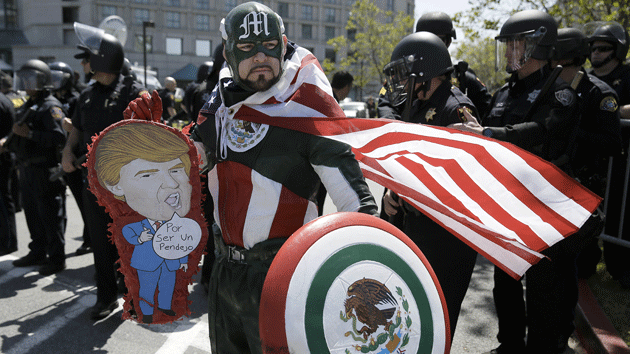
<a href="https://www.flickr.com/photos/thomashawk/24548952530/in/photolist-DpiNjf-DamRhu-C53Lf1-DjgtXx-9VjNra-xJ181W-BD3rgM-cJjFP-qu7Gu-wgukGJ-xGitau-9VT6fh-Go83c1-CtkRVA-BmMeY2-G7c1Xd-5yGqHa-zBdchV-qFSko-zit2v5-yUubNT-yUubdV-zyLLPy-D2Vkbn-DrTAmo-CSmM27-C5wyFT-CZBaPf-C5pCKu-C5xw9M-CtqTu4-C5xtNz-CZBsAm-CUCvmp-CUCoQP-CZB8zW-C5oNbf-CzMBJj-CzMAJo-CzMxAE-CUBBFF-CSkXib-C5vMC6-Ctp9mx-C5oJKs-Cu2ggr-DrpQUB-xRyc1-xVQhrF-xVQrTM">Thomas Hawk</a>/Flickr
Call it justicia divina.
After serving for months as punching bags for Republican candidates, Latinos may ultimately decide the outcome of the race. An upcoming report from two GOP consulting firms argues that Latino votes in California could prove decisive in 11 of the state’s 53 congressional districts—a swath that confers more delegates than 20 other states combined. “If Trump is going to be held under 1,237″—the number of delegates needed to avoid a contested convention—”it will largely be the result of Latino Republicans voting against his candidacy,” says Mike Madrid, whose firm, Grassroots Lab, co-authored the report with the GOP analytics firm Murphy Nasica.
Latino Republicans have far more clout than their numbers would suggest. Fewer than 1 in 5 California GOPers is Latino, but Madrid calculates that their primary votes, on average, will be worth a staggering 6.5 times more than those of the average white voter.
This situation stems from the state GOP’s quirky rules. Each congressional district confers three delegates in a winner-take-all election, regardless of how many Republicans live there. So a majority-white district in Orange County with 166,000 Republicans is worth the same as a majority-Latino one in East Lost Angeles with just 30,000 Republicans. In other words, those Republicans living in Democratic districts have the most powerful votes, and a disproportionate number of those Republicans, Madrid calculates, are Latinos.
“Finding Latino Republicans in these districts is like finding the Holy Grail,” he says. “The irony is that those votes have become the most effective and valuable for amassing delegates, but they are extremely hard to find because the party has not been there [in these areas] for 25 years.”
The Cruz campaign has invested heavily in targeting Latino-heavy districts in the Central Valley, Los Angeles County, and east of San Diego, with phone banking and precinct walking. “We are the only campaign that has the organization to do it,” says Mike Schroeder, the campaign’s California co-chair. “It’s not complicated; it’s simple, basic, nuts-and-bolts politics.”
But it’s also an uphill climb for an ultraconservative candidate like Cruz, who has staked out positions on immigration nearly identical to Trump’s. Cruz’s lead among Latino Republicans in California stands at a mere 4 percent and is unlikely to widen much before the June 7 primary, Madrid speculates. “Cruz has built his entire operation in appealing to Southern, white evangelicals,” he says. “It’s too late to pivot.”
















